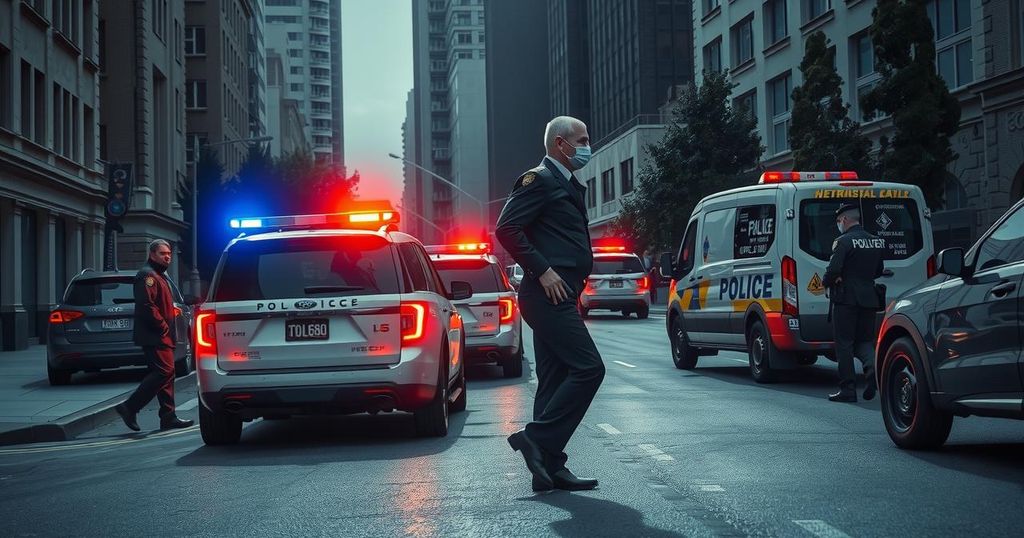Arrest of Nigerian Tycoon Ben Peters: A Detailed Account of the Incident

Ben Peters, a Nigerian businessman, was arrested in Ghana alongside 25 others for alleged road obstruction and illegal activities involving private security and unauthorized use of police sirens. His arrest prompted involvement from multiple security agencies due to threats made by his security detail. Reports concerning the nature of the incident vary, with some media sources denying claims of arrest, evidencing a need for clarity on the situation.
Benedict Peters, known as Ben Peters, a Ghana-based Nigerian businessman, was arrested alongside approximately 25 individuals at Aurora Apartments near the Jubilee House. The operation was executed by a joint task force composed of National Security operatives, Ghana Police Service, and the Ghana Armed Forces, led by Richard Jakpa and Mustapha Gbande, the Deputy Director of Operations at the Office of the President. Peters was subsequently transferred to the Greater Accra Regional CID for further questioning.
Allegations against Mr. Peters include several purported crimes, as outlined by Mustapha Gbande. Firstly, Peters allegedly blocked a road at the apartment complex with his vehicles and armed men, obstructing access for other residents. This blockade reportedly occurred after he was denied access to certain rooms by the apartment’s owners.
Secondly, Peters was found to possess vehicles equipped with police sirens, which is not permissible for private vehicles as per Ghana’s Road Traffic Regulations. Gabande specified that only certain authorized vehicles, including those of the President and police, are permitted to use sirens. Additionally, Peters is accused of operating an unauthorized security team, which requires official sanction under Ghanaian law.
Moreover, it was reported that Peters has around 20 unregistered vehicles and possessed a police motorcade without a number plate. The situation escalated when threats of violence were made by Peters’ security team against police personnel attempting to apprehend him, prompting National Security’s involvement due to fears of a potential gunfight near government premises.
Notably, Ibrahim Mahama, a Ghanaian businessman, played a role in Peters’ eventual arrest when he appeared at the scene after Peters had evaded capture. Various Nigerian media sources, including Vanguard, contest the Ghanaian reports, claiming Peters acted in a peaceful manner during the incident and was never arrested or detained, characterizing the scenario as a misunderstanding over a temporary traffic obstruction instead of a criminal arrest.
Footage from the arrest scene circulated later, revealing confrontations between Peters’ security detail and law enforcement officials, which included vehicles identifiable with police sirens associated with Peters’s operations. The situation was documented by multiple news outlets, illustrating a complicated intersection of business, local law, and security.
In conclusion, the arrest of Ben Peters, a prominent Nigerian businessman, raises several legal and ethical questions concerning the operation of security forces and the enforcement of local laws in Ghana. The discrepancies between various media reports suggest a need for clarity and transparency in handling such incidents, emphasizing the importance of lawful procedures and accountability in conflict situations involving private citizens and governmental authorities.
The recent arrest of Ben Peters, a Nigerian businessman, underscores the complexities entailed in legal compliance and the responsibilities of private security in Ghana. Allegations against him suggest serious infractions, including road obstruction and unauthorized use of police sirens, highlighting the need for stringent adherence to local laws. Furthermore, the contrasting media reports complicate perceptions of the incident, underscoring the importance of clear communication from authorities to establish an accurate public narrative. As the situation develops, it will be essential to monitor legal proceedings and the application of the rule of law.
Original Source: www.ghanaweb.com








